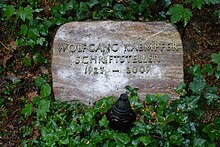Wolfgang Kaempfer
Wolfgang Kaempfer (born January 3, 1923 in Weißenburg ; † May 29, 2009 in Leezen ) was a German writer and essayist.
Life
Wolfgang Kaempfer was born on January 3, 1923 in Weißenburg (Bavaria). His parents were the writer and translator Hans Kaempfer and the singer Lisa Kaempfer, b. Rupp. He had two younger sisters. He spent his childhood with his parents in Braunschweig, in the house of his grandfather David Kaempfer, a physicist (specializing in optics and photography ). In 1934 the family went to Berlin, where he spent his youth. The family managed to keep the first name Cohn of the Poznan great-grandfather out of the papers (the so-called ancestral passport had existed since 1933 ).
From 1941 Wolfgang Kaempfer experienced the Second World War as a soldier and was taken prisoner by the Russians at the end of the war. The traumatic war experiences and the 18-month imprisonment significantly shaped his later publications. After returning home, he first studied natural sciences and later humanities at the Free University (FU) Berlin and received his doctorate in 1953. phil. in German studies.
He then worked as a dramaturge at the Sender Freies Berlin (now RBB) and at the stage publisher Felix Bloch Erben . At the same time he worked on novel projects and wrote Die Gartengesellschaft , a radio play produced by Radio Bremen under the direction of Oswald Döpke . In 1963 he went to the Goethe Institute and successively headed the foreign institutes in Algiers , Toulouse and Trieste . At this time he published various articles in literary journals (including Recherches germaniques) and a very critical monograph by the writer Ernst Jünger .
In the 1980s he came into contact with the Society for Historical Anthropology ( FU Berlin ) and its co-founder Dietmar Kamper . Since then, his work has increasingly dealt with the problems of time , history , aesthetics and civilization , which are among the main themes of his book publications. In particular, he developed and formulated a very independent time theory that was at the center of his scientific interest.
His last theoretical project, which arose out of conversations with his friend, the Berlin philosopher Klaus Heinrich , was supposed to put the "civilization-inducing" Heracles in scene as a gunman. In the years before his death, however, he again devoted himself to a novel project that had long since receded into the background. Unfortunately, these last works have remained a fragment.
Wolfgang Kaempfer was married four times. With his second wife Dorothee geb. Shepherd he had a son. He died in May 2009 at the age of 86 in Leezen in Mecklenburg. His grave is in the state-owned cemetery Heerstraße in Berlin-Westend (grave location: II-W1-47).
Fonts (selection)
Individual publications
- Ernst Jünger monograph. Metzler Verlag, Stuttgart 1981
- Wolfgang Kaempfer, Claudio Magris (ed.): Problemi del nichilismo . 1st edition. Shakespeare & Company, Brescia 1981, OCLC 461865021 .
- Wolfgang Kaempfer, HA Glaser (ed.): Maschinenmenschen , Frankfurt am Main / Bern / New York / Paris 1988
- The time and the clocks. With a contribution by Dietmar Kamper . Insel Verlag, Frankfurt am Main 1991, ISBN 3-458-16207-0
- Wolfgang Kaempfer with Friedrich Cramer : The nature of beauty. Insel Verlag, Frankfurt am Main 1992
- Time of man. The double game of time in the spectrum of human experience. Insel Verlag, Frankfurt am Main 1994, ISBN 978-3-458-16619-1
- Le double jeu du temps. (Zeit des Menschen, translated into French by Stefan Kaempfer) , L'Harmattan 1998, ISBN 2-7384-6393-2
- The silent explosion. Effects of the unleashed traffic time. In: leaps in time. Vorwerk 8 publishing house, Berlin 1999
- Zeitsturm (Dietmar Kamper's Mediterranean Conversations with Wolfgang Kaempfer), Tectum, 2004, ISBN 978-3-8288-8669-8
- The standing storm. (On the dynamics of social self-dissolution), Kadmos, 2005 ISBN 978-3-931659-78-3
- The invisible power. (with contributions by Jacques Poulain , Dietmar Kamper , Slavoj Žižek and Wolfgang Kaempfer), Sine Causa, 2005, ISBN 978-3-9810325-0-5
Articles and essays
- The I and death in Goethe's Werther. In: Recherches germaniques. Strasbourg 1979
- Time jam or the end without end. In: The Dying Time. Darmstadt / Neuwied 1987
- Masochism in literature. In: Forum of Psychoanalysis. 1987, 3
- Reflections on the structure of time in manic-depressive states. In: delusional worlds in collision. Psychosis in the mirror of time. Berlin 1993
- The time of painting and the space of music. On the question of exchanging the functions of the eye and ear. In: Paragrana. Journal of Historical Anthropology II / 93 H 1-2
- The prison of freedom. On the pathology of consciousness processes. In: Paragrana. VI / 1997 H 1
- The engine of consciousness. Beyond conscious and unconscious. In: Paragrana. VII / 1998 H 1
- Balance 2000 or The Infinite Times of Modern Times. In: Paragrana. IX / 2001 and island almanac for the year 2000
Individual evidence
- ^ Giuliano Manacorda: Grande folla l'altra sera alla libreria Shakespeare and Company ... (it) . In: Paese Sera , March 14, 1982, p. 7. Accessed December 1, 2019. "Grande folla l'altra sera alla libreria Shakespeare and Company per la presentazione del libro Problemi del nichilismo a cura di Claudio Magris e Wolfgang Kaempfer, edito dalla omonima casa editrice di Brescia. "
Web links
- Literature by and about Wolfgang Kaempfer in the catalog of the German National Library
- Literature by and about Wolfgang Kaempfer in the bibliographic database WorldCat
- Interview by Wolfgang Kaempfer (video, 2008)
- Wolfgang Kaempfer | Blog texts, materials, comments
| personal data | |
|---|---|
| SURNAME | Kaempfer, Wolfgang |
| BRIEF DESCRIPTION | German writer |
| DATE OF BIRTH | January 3, 1923 |
| PLACE OF BIRTH | Weissenburg |
| DATE OF DEATH | May 29, 2009 |
| Place of death | Leezen , Mecklenburg |
